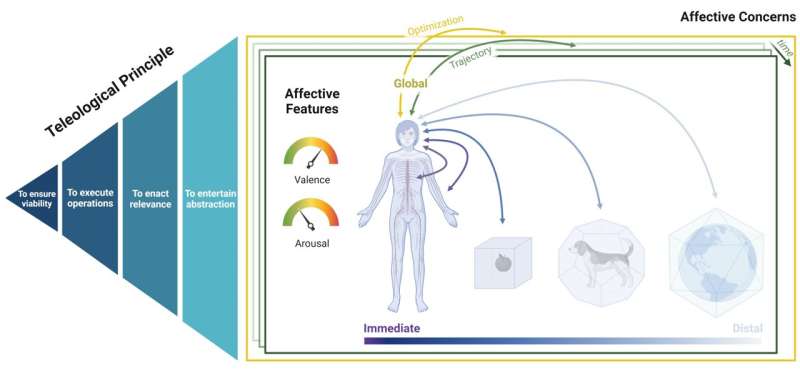This article has been reviewed according to Science X's editorial process and policies. Editors have highlighted the following attributes while ensuring the content's credibility:
fact-checked
trusted source
proofread
Global taskforce of scientists develop a unifying framework for the 'Human Affectome'

To improve upon current scientific understanding of how our feelings, emotions, and moods relate to and impact human behavior—known in the field as "affective science"—an interdisciplinary task force of 173 scientists from 23 countries, has created an integrative framework that encompasses the enormous array of affective phenomena that exist within the Human Affectome.
This organizational scheme allows vastly different scientific interests to relate to one another within the same theoretical framework, facilitating collaboration, translation, and application of affective research domains to better understand and develop treatments for mental disorders that involve severe alterations in mood, depression, and anxiety. The capstone paper, led by researchers at the Icahn School of Medicine at Mount Sinai, describing these efforts appears in Neuroscience & Biobehavioral Reviews.
Thousands of words are commonly used in language to describe our feelings, emotions, moods, and sensory experiences like smells, sounds, tastes, and visual imagery. These day-to-day life experiences have a significant impact on decision-making and behavior.
However, they fall into many fragmented areas of study, so neuroscientists have faced a longstanding challenge to find a comprehensive and integrative framework for these experiences that can serve as a common focal point for research. Although many models have been proposed, broad agreement in support of at least a unifying framework that would host these models has been elusive and many competing perspectives exist in isolation.
To solve this challenge, the Human Affectome Project was launched in 2016 by Neuroqualia, a Canadian-based non-profit organization. The task force initially used a computational linguistics approach to scour data from more than 4.5 million books containing close to half a trillion words to identify more than 3,600 words in the English language that describe sensations, emotions, and moods.
Then, 12 teams of researchers reviewed much of what is currently known about feelings, emotions, and moods from a neuroscience perspective, while simultaneously reviewing the linguistic terms that are commonly used to describe these experiences. The group then developed a model that situates these experiences within a single unifying framework. This final synthesis, which is a capstone effort, has been led by Daniela Schiller, Ph.D., Professor of Neuroscience, and Psychiatry, and Alessandra C. Yu, a Ph.D. candidate in the Schiller Lab at Icahn Mount Sinai, and Leroy Lowe, Ph.D., President of Neuroqualia.
In this first attempt at modeling the Human Affectome—the conceptual umbrella that encompasses all affective experiences—each experience is marked by its valence (positive or negative) and the degree to which it is associated with energy levels or arousal. The full range of these experiences are grouped into physiological concerns (the most immediate, such as feeling hungry), operational concerns (arising through interaction with the environment, such as fear), and global concerns (our overall prospects and well-being).
At the heart of this framework is an understanding that individuals are monitoring and managing various concerns simultaneously within their own comfort zones. When they are faced with experiences that are outside of these comfort zones, it creates stress and triggers restorative behaviors that are ultimately intended to preserve our well-being.
This framework will be especially helpful for those who are studying mental health disorders that involve severe alterations in emotions and mood, such as depression and anxiety. It will also help researchers better understand how feelings, emotions, and moods affect decision-making and human behavior, which is particularly important in many fields. Finally, it also has enormous implications for the field of artificial intelligence, where researchers are focused on creating computers and robots that can emulate human feelings and emotions for a wide variety of tasks.
"As neuroscientists, we are normally focused on the cognitive processes and brain mechanisms that underpin specific aspects of affective experience, so it has been quite refreshing and extremely helpful to collaborate with this group to develop a framework that can host all affective experiences with unifying terminology and agreement about their purpose," said Dr. Schiller.
"The work is expansive in scope, but this is the first time that we have had a unifying framework that brings all of these components together. Within this framework, we can now compare various models and organize them in relation to their level of investigation and goals. In this sense, this is a truly unifying endeavor—it doesn't provide one winning model but rather brings together competing models and lines of research, so that we can now construct them into an integrative understanding of the Human Affectome as a whole. We hope this work will energize discussions and instigate collaborations among many researchers."
More information: Daniela Schiller et al, The Human Affectome, Neuroscience & Biobehavioral Reviews (2023). DOI: 10.1016/j.neubiorev.2023.105450





















